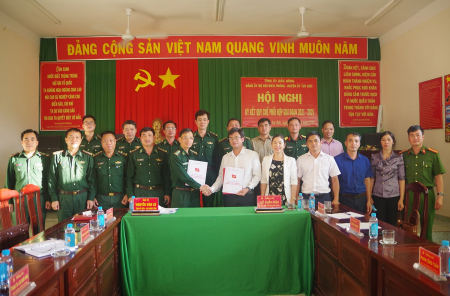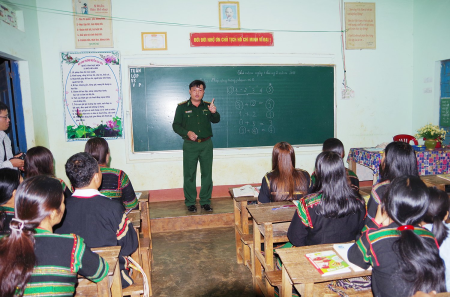Public mobilisation plays a very important role in carrying out border guard duties. Recognising this significance, Dak Nong Border Guard forces has consistently stepped up this crucial work with various effective and coordinated strategies and solutions, contributing to enhancing the image of “Uncle Ho’s Border Guard,” consolidating the people’s support, and building a strong and resilient all-people border defence posture.
To establish the legal basis for effectively mobilising the public to participate in safeguarding border sovereignty and security, the Party Committee and the Command of the Provincial Border Guard collaborate with the Provincial Party Committee and People’s Committee to issue resolutions, directives, and develop a system of documents, regulations, and coordination programmes with local Party organisations, authorities, departments, agencies, and offices. In addition, Dak Nong Border Guard proactively advises local authorities in enhancing the effectiveness of their governance, administrative, and organisational activities; leveraging the role of the Fatherland Front, local committees, departments, and organisations at all levels to create the combined strength of the political system and the entire population in participating in the establishment and consolidation of a strong political system in the border area linked to the tasks of managing and protecting the national border. During the implementation process, the Provincial Border Guard strengthens the contingent of officers participating in local Party committees and authorities at all levels in border areas; assigns tasks to Party members of border posts attached to Party organisations in border hamlets, villages; designates Party members to assist households in the border area, leaving no border village and hamlet without Party member. At the same time, Dak Nong Border Guard regularly conducts propaganda and mobilisation work among ethnic minority communities to actively engage in production for hunger elimination and poverty reduction, build new rural areas, apply science and technology for economic, cultural, and social development in combination with strengthening defence and security; and firmly prevent the exploitation of ethnic and religious issues to undermine the unity among ethnic groups, maintaining political and social stability. To achieve effectiveness in these tasks, the teams and groups engaged in public mobilisation utilise the active roles of elders, chiefs and respected individuals in villages, hamlets and families to assist, educate, and mobilise families and houses to strictly adhere to the Party’s guidelines and policies, and the State’s laws. Also, border guard cadres provide advice to local Party committees and authorities to effectively address outstanding issues, challenges, and disputes among ethnic minority communities. At the same time, the Provincial Border Guard effectively implements programmes and models to help people in socio-economic development, such as “Helping children’s schooling – adopted children of border guard posts,” “Companion of border women,” “Military officers and soldiers help children’s schooling,” “Breeding cattle for the poor in border areas,” and “Classrooms in the border,” the movement “the entire population participate in safeguarding sovereignty, territorial integrity, and national border security in the new situation,”etc. to strengthen the close unity between the military and the people. Especially in recent times, with the efforts and dedication of officers, soldiers, local public mobilisation work in the assigned area of the Dak Nong Border Guard has been increasingly profound, with tangible results. In 2022, agencies and units under the Provincial Border Guard supported 62 students, including 50 in the border areas and 12 in two outer communes, with a monthly amount of 500,000 VND/student and adopted 04 other children. In addition, it provided support to 101 students with a total of 444 million VND for the last four months of 2022, organised “Classrooms in the border” with 24 sessions and the participation of 1,235 students and teachers, and mobilised 27 collectives, 599 households, and 442 individuals to register for public-management of 94 km of border roads, 62 border markers, and 74 security and public order self-management teams with 542 members, etc. Thanks to the synchronous implementation of practical and specific measures in the public mobilisation work of the Provincial Border Guard, it has contributed to building a border area that is economically and socially developed and politically stable, ensuring national independence and sovereignty and border security; maintaining a peaceful, friendly, united, and cooperative border.
 |
| The Provincial Border Guard signs coordination plan with Tuy Duc district |
However, Dak Nong has a vast border area with harsh weather conditions and climate, slow infrastructure development, uneven educational levels among the population, and people facing many difficulties, including a high poverty rate and persistent backward customs and habits. In addition, hostile forces always exploit issues related to “ethnicity,” “religion,” “democracy,” and “human rights” to conduct illegal religious activities and unchecked immigration and spread distorted propaganda to incite dissent, divide the population, and cause instability in the region. Criminal activities such as trafficking, use, transportation, and possession of drugs, as well as smuggling pose complex threats. Faced with this situation, the Party Committee and the Command of the Provincial Border Guard determine that it is necessary to continue to strengthen public mobilisation to create a combined strength for the defence sovereignty, territorial integrity, and border security with the following focused solutions:
First, actively provide advice to the Provincial Party Committee and People’s Committee in leading, directing, and effectively implementing public mobilisation work. The Provincial Border Guard must adhere to and strictly implement resolutions and directives from higher authorities, especially the Border Guard Party Committee and Command, and local Party committees and authorities regarding public mobilisation. In addition, it must emphasise the responsibilities of Party committees, party organisations, political commissars, commanders, and political departments in leading, directing, and organising the implementation of public mobilisation work. Also, Dak Nong Border Guard must grasp the situation, provide advice, and propose strategies to higher authorities and the Provincial Party Committee and People’s Committee to enhance the effectiveness of public mobilisation in carrying out the tasks of monitoring and protecting the sovereignty and national border security. Furthermore, it is critical to continue to effectively implement Resolution No. 03-NQ/TU, dated 9 March 2021, and Action Programme No. 10-CTr/TU, dated 11 June 2021, of the Provincial Party Committee. Besides, border guard posts should supplement and ratify coordination programmes with local Party committees, authorities, administrative departments in border districts and communes. Also, the People’s Committees and the Fatherland Front Committees of border communes should define the content, requirements, scope, responsibilities, and authorities for each target group with close alignment to the local situation and characteristics and concretised these contents into efficient plans and organised effectively.
 |
| Thuan An border gate post holds class for ethnic minorities in the area |
Second, intensify propaganda to enhance the awareness and sense of responsibility of the population. The content of the propaganda should delve into disseminating the Party’s policies, the State’s laws, border agreements and regulations, and laws on crime prevention, drug control, residence management, and weapon control. To improve the effectiveness of propaganda work, it is necessary to innovate in forms and methods, closely integrate propaganda work with border guard work, and conduct local area development with understandable, memorable methods and models that are suitable for the local conditions, characteristics, and intellectual levels of the population. Border posts, with their core being public mobilisation teams, must operate in accordance to the guidance of their Party committees and commands, and closely coordinate with local departments, agencies, and organisations. They should leverage the roles of elders and chiefs of villages and hamlets and respected individuals of families and ethnic groups to enhance the quality and effectiveness of mobilisation and propaganda work. This should be closely aligned with the implementation of the Project “Promote the role of the People’s Army in popularising and educating legal knowledge, mobilising the people to comply with the law at the grassroots level in the period from 2021 to 2027.”Additionally, emphasis should be placed on coordinating and organising propaganda through local and central media outlets regarding the results of the nationwide movement to protect sovereignty and border security, coupled with the organisation of annual “All-people Border Guard Day” activities. This will contribute to raising public awareness of national borders, making the people understand that the nature of national sovereignty and territory is sacred and inviolable, so that they will actively engage in safeguarding sovereignty and border security and promoting a vigilant spirit to prevent hostile forces from exploiting ethnic and religious issues for subversion.
Third, proactively coordinate with local Party committees and authorities to participate in consolidating and establish a comprehensive, strong political foundation. To effectively implement this solution, the Provincial Border Guard Party Committee and Command must proactively collaborate with local Party committees, authorities, departments, and organisations in border regions, as well as units stationed in the area, to grasp the situation and timely provide advice in developing strategies and solutions to consolidate, complete, and enhance the quality of organisations within the grassroots-level political system. In addition, it is essential to continue to effectively implement the policy of attaching border guard personnel to border villages, assigning Party members to assisting households in border areas, and promoting the participation of Border Guard members in activities at the grassroots level. This includes actively implementing the model of Border Guard Party members participating in activities of Party committees in border villages and hamlets.
In the lead-up to the commemoration of the 20th anniversary of the establishment of the Dak Nong Provincial Border Guard (9 January 2024), imbued with the teachings of President Ho Chi Minh: “Those in charge of public mobilisation must wholeheartedly immerse themselves in the work,” the officers and soldiers of the Dak Nong Border Guard elevate the “Respect the people, be close to the people, understand the people, learn from the people, and be responsible to the people” spirit. They excel in the practice of “eating together, living together, working together, and speaking the ethnic language with the people,” always listening to and understanding the people to gain the people’s trust, and actively participate in helping the people eradicate hunger and reduce poverty, build new rural areas, and develop the local economy, culture, and society. Furthermore, they continue to expand models of providing breeding cattle, goats, and crossbred pigs for the poor in border areas, as well as programmes like “The Companion of Border Women,” “Helping children’s schooling - adopted children of border guard posts,” and the project “Military officers and soldiers help children’s schooling,” etc. Simultaneously, they mobilise ethnic minority communities to develop new cultural lifestyles, eliminate backward customs, and preserve and promote the cultural identity of ethnic groups. Furthermore, the Provincial Border Guard strengthens border diplomacy and people-to-people diplomacy in border areas, aiming to continuously improve the effectiveness of public mobilisation work, harnessing the collective strength of both the political system and the people to build a strong and resilient national border defence, ensuring the firm defence of territorial sovereignty and national border security.
Senior Colonel VU XUAN DAI, Commander of Dak Nong Provincial Border Guard